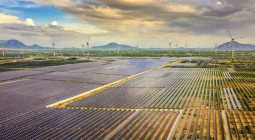South Africa: Energy shift eroding municipal revenue models
Veer Ramnarain, President of the South African Institute of Electrical Engineers (SAIEE) told ESI Africa Editor-in-Chief that there are several drivers behind this
South African municipalities are facing a persistent decline in revenue – a trend that has been evident for several years – as the energy transition reshapes traditional business models.
At Enlit Africa 2025 Veer Ramnarain, President of the South African Institute of Electrical Engineers (SAIEE) told ESI Africa Editor-in-Chief that there are several drivers behind this erosion of income.
“Firstly, many customers are dissatisfied with the quality of supply, particularly due to the impacts of loadshedding and are taking steps to meet their own energy needs.
“Secondly, there is a growing demand for green energy… or ‘green electrons’, as I call them. Thirdly, rising electricity prices are prompting more consumers to look for alternatives,” he said.
Municipalities’ strategy questioned
Ramnarain questioned why municipalities are allowing private sector players to dominate the local energy generation and distribution space.
“If you fly over cities, you’ll see vast amounts of unused rooftop space. I’ve been saying for many years that this is the most valuable real estate for the future.
“Municipalities could rent out that space, install their own solar PV systems, and sell the electricity directly to customers. This is a revenue stream that is readily available,” he said.
Skills and in-house expertise present another opportunity.
Several factors impacting municipal revenue streams in South Africa
While some municipalities still have large numbers of engineers and technical staff, Ramnarain believes these resources are under-used.
“Municipalities could use their own engineers to conduct network studies so that, when private players want to operate in the municipal space, the necessary engineering work can be done internally, at a cost, creating another income stream.”
Beyond revenue, climate change poses a further challenge.
Extreme weather events are becoming more frequent worldwide and South Africa is not immune.
“This is not unique to South Africa… we’ve seen an increase in the frequency and severity of major storms globally. These have a significant impact on municipalities. As engineers, we are trained to manage and design for risk, but these events are creating new pressures that municipalities must be prepared to face,” said Ramnarain.
Cover photo: : lovelyday©123rf.com



